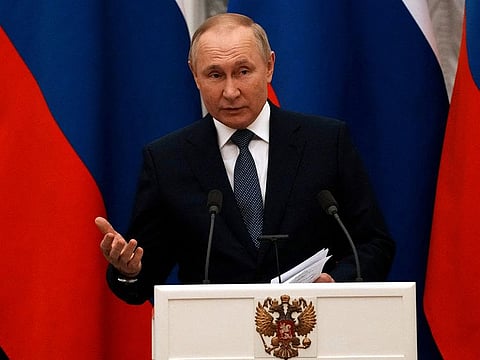Russia has announced military mobilisation. What does it mean?
Moscow has 2 million-strong military reserves at its disposal

Russian President Vladimir Putin has announced partial military mobilisation. This is Russia’s first military mobilisation since World War II.
In a rare televised address, Russian President said his goals in Ukraine have not changed. Putin warned the West that if it continued what he called its “nuclear blackmail”, Moscow would respond with the might of all its vast arsenal. “This is not a bluff,” the Russian President added.
The announcement has come at a time when world leaders have convened at the United Nations in New York for the first full, in-person General Assembly since the Covid-19 pandemic.
In his address, Putin said the partial mobilisation of its 2 million-strong military reservists was to defend Russia and its territories. The West did not want peace in Ukraine, he said.
He said Washington, London, Brussels were pushing Kyiv to “transfer military operations to our territory” with the aim of the “complete plunder our country”.
Ukraine’s military has hit targets inside Russia intermittently throughout the conflict, using long-range weapons supplied by the West.
“Nuclear blackmail has also been used,” Putin said, citing Ukraine’s Zaporozhzhia nuclear power plant, the biggest in Europe. Both Russia and Ukraine have accused each other of endangering the plant in the fighting.
He accused officials of Nato countries of making statements about “the possibility and admissibility of using weapons of mass destruction against Russia — nuclear weapons”.
“To those who allow themselves such statements regarding Russia, I want to remind you that our country also has various means of destruction, and in some components more modern than those of the Nato countries.”
Putin restated his aim was to “liberate” the Donbas, Ukraine’s industrial heartland, and said most people there did not want to return to what he called the “yoke” of Ukraine.
The developments in Moscow dominated discussions at the annual UN General Assembly meetings on Tuesday where world leaders condemned military violence and lamented the global hardship caused by chaos in food supply chains and soaring energy prices.
Russia came in for some sharp criticism too. "The United States will never recognize Russia's claims" to Ukraine territories purportedly annexed by Russia, Jake Sullivan, the US national security adviser, noted. NATO Secretary General Jens Stoltenberg, British Prime Minister Liz Truss, French President Emmanuel Macron and Japanese Prime Minister Kishida Fumio also condemned the move.
The Chinese struck a cautious note. "Every country’s reasonable security concerns should be valued, and all efforts conducive to resolving the crisis peacefully should be supported. China calls for dialogue and consultation to resolve the divergences," Wang Wenbin, spokesperson of China’s Foreign Ministry said.
What is mobilisation?
Mobilisation is the act of assembling reserve forces for active duty in times of war or national emergency. Sergei Shoigu, Russia’s defence minister, said the partial mobilisation will see 300,000 reserves called up and it would apply to those with previous military experience.
What does it mean for those mobilised?
Those Russians who have already taken military training will undergo extra training and will sign a contract. The ‘mobilised soldiers’ contracts will not expire until the end of the partial mobilisation. All those mobilised to fight in Ukraine will receive the same salaries and bonuses as those who sign a military contract to serve in Russia’s Armed Forces.
What is Russia’s strength of military reserves?
Moscow has 2 million-strong military reserves at its disposal. Only those citizens currently in the reserve will be subject to a call up for military service. “First and foremost those who have served in the ranks of the Armed Forces,” Putin said in the national address.
Is this about Donbas?
Putin noted that Russia’s aim was to liberate East Ukraine’s Donbas industrial heartland. Moscow considers Luhansk and Donetsk, which together make up the Donbas region, to be independent states. (Russia currently holds about 60% of Donetsk and all of Luhansk)
Is there going to be a referendum?
Four regions in Ukraine have said they are planning to hold referendums on joining the Russian Federation in a series of announcements, paving way for Kremlin to formally annex those territories.
On Sep. 20, the authorities of the Donetsk People’s Republic, Luhansk People’s Republic, as well as the administrations of Kherson and Zaporizhzhia Oblasts, announced referendums on joining Russia between Sep. 23—27.
Russia’s foreign minister, Sergey Lavrov, said the referendums would allow the territories to decide their future. “The current situation confirms that they want to be the masters of their future,” Lavrov told Rossiya-1.
Why the referendum now?
Moscow is gearing to firm up its hold over territory in the east and south of Ukraine. The referendums by four regions to formally join Russia and Putin’s announcement has come around the same time.
Given Ukraine’s advances in recent days, Russia could declare that it would treat any further attacks on those regions, parts of which are still controlled by Ukraine, as an attack on Russia itself.
What is the world reaction?
Josep Borrell, EU’s top diplomat, said in a statement that the bloc and its member states would refuse to recognise the results of the referendums and that it would consider additional sanctions.
Antony Blinken, US Secretary of State, said that Russia is moving ahead with referendums in Ukrainian territory, and that Russian President Vladimir Putin is reportedly contemplating mobilising more reserve forces while the UN General Assembly is happening.
“The very principles that we're here to uphold this week in the charter of sovereignty, independence, territorial integrity, are what are being violently aggressed,” Blinken added.
(With inputs from agencies)


